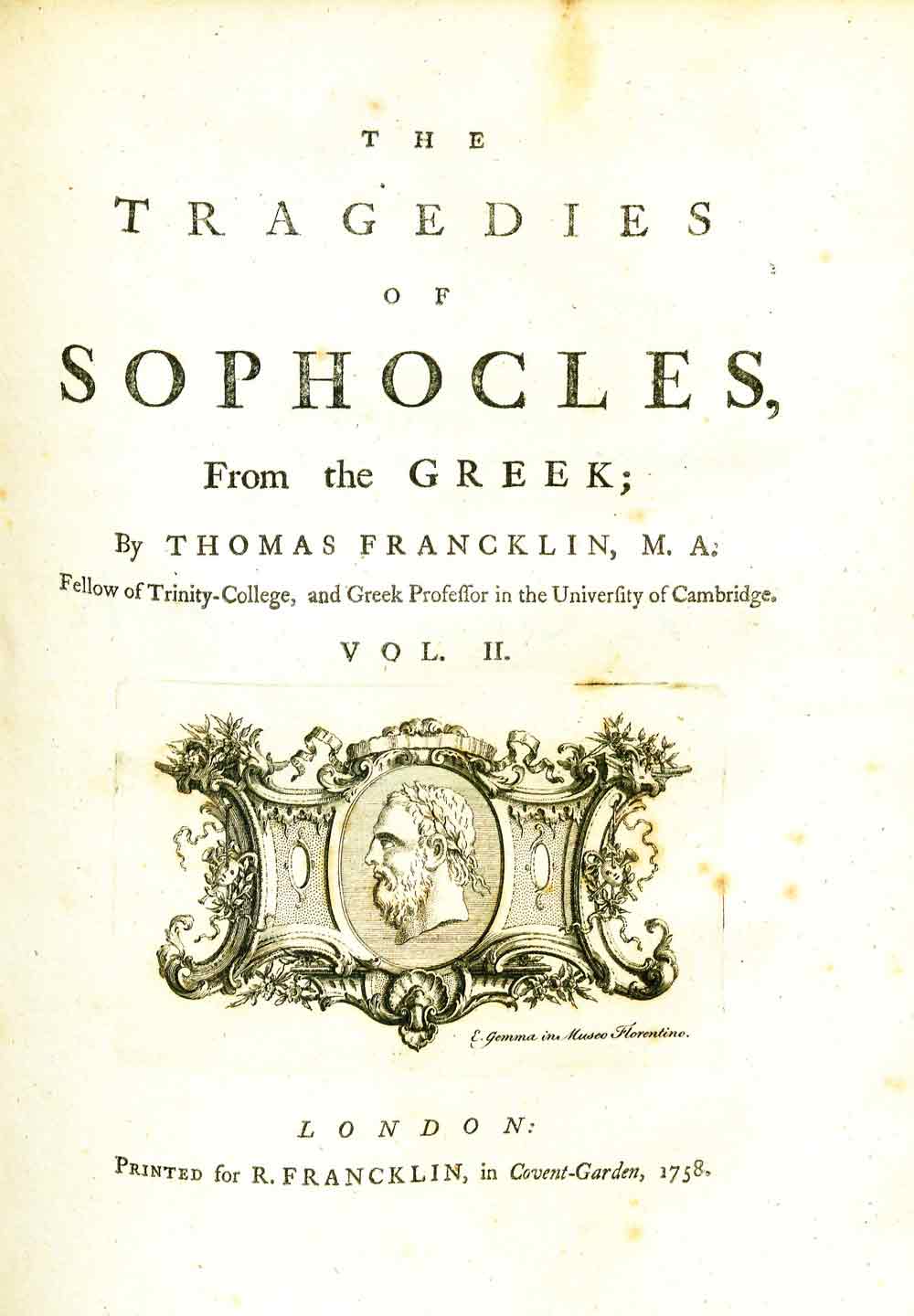Difference between revisions of "Tragedies of Sophocles"
(→by Sophocles) |
|||
| Line 3: | Line 3: | ||
__NOTOC__ | __NOTOC__ | ||
Sophocles (c. 496 – c.406BCE) was born at Colonus to a wealthy manufacturing family but became one of the great Athenian tragedians.<ref>[http://www.oxfordreference.com/view/10.1093/acref/9780199548545.001.0001/acref-9780199548545-e-2775 "So'phoclēs”] in ''The Oxford Companion to Classical Literature'', ed. by M.C. Howatson (Oxford: Oxford University Press, 2011).</ref> Though an anonymous biography of him exists, little information can be trusted in it due to lack of verification. Sophocles’s first tragic victory was at the Great Dionysia in 468BCE, supposedly his very first competition and also against the already established tragedian Aeschylus. He stayed away from politics, though he was twice elected a general with the Athenian ruler Pericles (c. 441/40BCE), and “is said to have refused invitations to visit the courts of kings (unlike Aeschylus and Euripides).” Sophocles was known as a good tempered man and citizen who also, just months before his own death, had his chorus and actors perform in mourning garb in honor of the recently deceased Euripides.<ref>Ibid.</ref><br/> | Sophocles (c. 496 – c.406BCE) was born at Colonus to a wealthy manufacturing family but became one of the great Athenian tragedians.<ref>[http://www.oxfordreference.com/view/10.1093/acref/9780199548545.001.0001/acref-9780199548545-e-2775 "So'phoclēs”] in ''The Oxford Companion to Classical Literature'', ed. by M.C. Howatson (Oxford: Oxford University Press, 2011).</ref> Though an anonymous biography of him exists, little information can be trusted in it due to lack of verification. Sophocles’s first tragic victory was at the Great Dionysia in 468BCE, supposedly his very first competition and also against the already established tragedian Aeschylus. He stayed away from politics, though he was twice elected a general with the Athenian ruler Pericles (c. 441/40BCE), and “is said to have refused invitations to visit the courts of kings (unlike Aeschylus and Euripides).” Sophocles was known as a good tempered man and citizen who also, just months before his own death, had his chorus and actors perform in mourning garb in honor of the recently deceased Euripides.<ref>Ibid.</ref><br/> | ||
| − | <br/>Only seven of Sophocles’ tragedies are extant: ''Philoctetes'', ''Ajax'', ''Electra'', ''Trachiniae'' (''Women of Trachis''), and the Oedipal Trilogy (also known as the Oedipal Cycle) consisting of ''Oedipus Tyrannus'' (''Oedipus the King''), ''Oedipus at Colonus'', and ''Antigone''.<ref>http://www.oxfordreference.com/view/10.1093/acref/9780192801463.001.0001/acref-9780192801463-e-2067 " Sophoclēs "] in ''Oxford Dictionary of the Classical World'', ed. by John Roberts (Oxford: Oxford University Press, 2007).</ref><br/> | + | <br/>Only seven of Sophocles’ tragedies are extant: ''Philoctetes'', ''Ajax'', ''Electra'', ''Trachiniae'' (''Women of Trachis''), and the Oedipal Trilogy (also known as the Oedipal Cycle) consisting of ''Oedipus Tyrannus'' (''Oedipus the King''), ''Oedipus at Colonus'', and ''Antigone''.<ref>[http://www.oxfordreference.com/view/10.1093/acref/9780192801463.001.0001/acref-9780192801463-e-2067 " Sophoclēs "] in ''Oxford Dictionary of the Classical World'', ed. by John Roberts (Oxford: Oxford University Press, 2007).</ref><br/> |
<br/>The ''Tragedies of Sophocles'' is a work combining two volumes into one. It was translated from the original Ancient Greek into English by Thomas Francklin, M.A. He was a fellow of Trinity College and a Greek professor at the University of Cambridge. The works included are ''Ajax'', ''Electra'', ''Philoctetes'', and the Oedipal Cycle: ''Antigone'', ''Oedipus Tyrannus'', and ''Oedipus Coloneus'' (''Oedipus at Colonus''). | <br/>The ''Tragedies of Sophocles'' is a work combining two volumes into one. It was translated from the original Ancient Greek into English by Thomas Francklin, M.A. He was a fellow of Trinity College and a Greek professor at the University of Cambridge. The works included are ''Ajax'', ''Electra'', ''Philoctetes'', and the Oedipal Cycle: ''Antigone'', ''Oedipus Tyrannus'', and ''Oedipus Coloneus'' (''Oedipus at Colonus''). | ||
Revision as of 15:43, 28 January 2014
by Sophocles
Sophocles (c. 496 – c.406BCE) was born at Colonus to a wealthy manufacturing family but became one of the great Athenian tragedians.[1] Though an anonymous biography of him exists, little information can be trusted in it due to lack of verification. Sophocles’s first tragic victory was at the Great Dionysia in 468BCE, supposedly his very first competition and also against the already established tragedian Aeschylus. He stayed away from politics, though he was twice elected a general with the Athenian ruler Pericles (c. 441/40BCE), and “is said to have refused invitations to visit the courts of kings (unlike Aeschylus and Euripides).” Sophocles was known as a good tempered man and citizen who also, just months before his own death, had his chorus and actors perform in mourning garb in honor of the recently deceased Euripides.[2]
Only seven of Sophocles’ tragedies are extant: Philoctetes, Ajax, Electra, Trachiniae (Women of Trachis), and the Oedipal Trilogy (also known as the Oedipal Cycle) consisting of Oedipus Tyrannus (Oedipus the King), Oedipus at Colonus, and Antigone.[3]
The Tragedies of Sophocles is a work combining two volumes into one. It was translated from the original Ancient Greek into English by Thomas Francklin, M.A. He was a fellow of Trinity College and a Greek professor at the University of Cambridge. The works included are Ajax, Electra, Philoctetes, and the Oedipal Cycle: Antigone, Oedipus Tyrannus, and Oedipus Coloneus (Oedipus at Colonus).
| The Tragedies of Sophocles | |
|
Title page from The Tragedies of Sophocles, volume two, George Wythe Collection, Wolf Law Library, College of William & Mary. | |
| Author | Sophocles |
| Published | London: Printed for R. Francklin |
| Date | 1758-59 |
| Language | English |
| Volumes | 2 volume set |
| Desc. | 4to. (28 cm.) |
Evidence for Inclusion in Wythe's Library
Description of the Wolf Law Library's copy
Re-bound in thick leather covers of reddish-brown with bright gold title on the pine. Elaborately-detailed etching of Sophocles at his writing desk with angels cavorting overhead as the frontispiece. Purchased from Pleasant Street Books.
View this book in William & Mary's online catalog.
External Links
References
- ↑ "So'phoclēs” in The Oxford Companion to Classical Literature, ed. by M.C. Howatson (Oxford: Oxford University Press, 2011).
- ↑ Ibid.
- ↑ " Sophoclēs " in Oxford Dictionary of the Classical World, ed. by John Roberts (Oxford: Oxford University Press, 2007).
